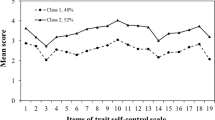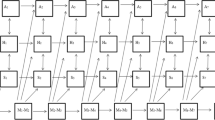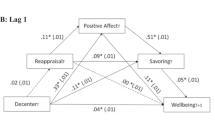Abstract
Enhancing subjective well-being is essential for enlightening individual pursuit of a better life in positive psychology. Although numerous research projects have preliminarily investigated the effect of mindfulness (MD) on subjective well-being (SWB) and its potential mechanisms, few longitudinal studies have investigated the bidirectional association between MD and SWB at both trait and state levels. On this basis, this study aimed to comprehensively explain the temporary and longitudinal relationships between MD and SWB [positive affect (PA), negative affect (NA), life satisfaction (LS)] at both trait and state levels using the longitudinal and weekly diary methods. A two-wave longitudinal survey with a time interval of eight months from a sample of 504 adolescents (N = 504; M = 15.11; 56.2% female) and a seven-week weekly diary survey from a sample of 117 adolescents (N = 117; M = 15.64; 65.81% female) were designed in studies 1 and 2, respectively. In study 1, first, the confirmatory factor analysis was performed on SWB as a hierarchical construct to confirm that the global subjective well-being (gSWB) could explain the covariance among its first-order factors (PA, NA LS, Model 1). Then, two cross-lagged models (Model 2: MD - PA, NA, LS; Model 3: MD - gSWB) were constructed to explore the bidirectional relationship between trait mindfulness and SWB (PA, NA, LS, and gSWB) through Mplus 8.3. In study 2, the hierarchical linear models were initially constructed to explore the correlation between state mindfulness and SWB. Furthermore, the longitudinal hierarchical linear models were conducted to examine the cross-lagged relationship between state mindfulness and SWB. Overall, the results of the longitudinal study revealed that (1) trait mindfulness positively predicted PA and LS and negatively predicted NA; (2) trait mindfulness showed a reciprocal prediction with NA; (3) gSWB positively predicted trait mindfulness. In addition, the results of the weekly diary study indicated that (1) state mindfulness of the current week positively predicted PA and LS in the following week and negatively predicted NA in the following week. (2) PA and LS of the current week positively predicted state mindfulness in the following week. Findings suggest that, to some extent, there is a reciprocal relationship between MD and SWB, which not only contributes to our understanding of mindfulness at both trait and state levels, but also provides an empirical foundation for improving adolescents’ subjective well-being.


Similar content being viewed by others
References
Abasi, I., Mohammadkhani, P., Pourshahbaz, A., & Dolatshahi, B. (2017). The psychometric properties of attentional control scale and its relationship with symptoms of anxiety and depression: A study on iranian population. Iranian Journal of Psychiatry, 12(2), 109–117.
Baer, R., Gu, J., Cavanagh, K., & Strauss, C. (2019). Differential sensitivity of mindfulness questionnaires to change with treatment: A systematic review and meta-analysis. Psychological Assessment, 31(10), 1247–1263. https://doi.org/10.1037/pas0000744.supp
Bajaj, B., & Pande, N. (2016). Mediating role of resilience in the impact of mindfulness on life satisfaction and affect as indices of subjective well-being. Personality and individual differences, 93, 63–67. https://doi.org/10.1016/j.paid.2015.09.005
Baumeister, R. F., Bratslavsky, E., Finkenauer, C., & Vohs, K. D. (2001). Bad is stronger than good. Review of General Psychology, 5(4), 323–370. https://doi.org/10.1037/1089-2680.5.4.323
Bishop, S. R., Lau, M., Shapiro, S., Carlson, L., Anderson, N. D., Carmody, J., Segal, Z. V., Abbey, S., Speca, M., Velting, D., & Devins, G. (2004). Mindfulness: A proposed operational definition. Clinical Psychology: Science and Practice, 11(3), 230–241. https://doi.org/10.1093/clipsy/bph077
Bolger, N., Davis, A., & Rafaeli, E. (2003). Diary method: Capturing life as it is lived. Annual Review of Psychology, 54(2), 579–616. https://doi.org/10.1146/annurev.psych.54.101601.145030
Bravo, A. J., Pearson, M. R., Wilson, A. D., & Witkiewitz, K. (2018). When traits match states: Examining the associations between self-report trait and state mindfulness following a state mindfulness induction. Mindfulness, 9(1), 199–211. https://doi.org/10.1007/s12671-017-0763-5
Brown, K. W., & Ryan, R. M. (2003). The benefits of being present: Mindfulness and its role in psychological well-being. Journal of Personality and Social Psychology, 84(4), 822–848. https://doi.org/10.1037/0022-3514.84.4.822
Busseri, M. A. (2015). Toward a resolution of the tripartite structure of subjective well-being. Journal of Personality, 83(4), 413–428. https://doi.org/10.1111/jopy.12116
Busseri, M. A., & Sadava, S. W. (2011). A review of the tripartite structure of subjective well-being: Implications for conceptualization, operationalization, analysis, and synthesis. Personality and Social Psychology Review, 15(3), 290–314. https://doi.org/10.1177/1088868310391271
Castro, S. L. (2002). Data analytic methods for the analysis of multilevel questions. The Leadership Quarterly, 13(1), 69–93. https://doi.org/10.1016/s1048-9843(01)00105-9
Chen, X., Liang, K., Huang, L., Mu, W., Dong, W., Chen, S., & Chi, X. (2022). The psychometric properties and cutoff score of the child and adolescent mindfulness measure (CAMM) in chinese primary school students. Children, 9(4), 499. https://doi.org/10.3390/children9040499
Christopher, M. S., Charoensuk, S., Gilbert, B. D., Neary, T. J., & Pearce, K. L. (2009). Mindfulness in Thailand and the United States: A case of apples versus oranges? Journal of clinical psychology, 65(6), 590–612. https://doi.org/10.1002/jclp.20580
Cohen, J., Cohen, J., Cohen, J. W., Cohen, J., Cohen, J., Cohen, J., Cohen, J., Cohen, J. W., Cohen, N., & Cohen, C. (1988). Statistical power analysis for the behavioral science. Technometrics, 31(4), 499–500. https://doi.org/10.4324/9780203771587
Cohen, S., Doyle, W. J., Skoner, D. P., Fireman, P., Gwaltney, J. M., & Newsom, J. T. (1995). State and trait negative affect as predictors of objective and subjective symptoms of respiratory viral infections. Journal of Personality and Social Psychology, 68(1), 159–169. https://doi.org/10.1037/0022-3514.68.1.159
Díaz, A., Soriano, J. F., & Beleña, Á. (2016). Perceived vulnerability to disease questionnaire: Factor structure, psychometric properties and gender differences. Personality and Individual Differences, 101, 42–49. https://doi.org/10.1016/j.paid.2016.05.036
Diener, E. (2000). Subjective well-being: The science of happiness and a proposal for a national index. American Psychologist, 55(1), 34–43. https://doi.org/10.1037/0003-066X.55.1.34
Diener, E. D., Emmons, R. A., Larsen, R. J., & Griffin, S. (1985). The satisfaction with life scale. Journal of Personality Assessment, 49(1), 71–75. https://doi.org/10.1207/s15327752jpa4901_13
Diener, E., Lucas, R. E., & Oishi, S. (2018). Advances and open questions in the science of subjective well-being. Collabra: Psychology, 4(1), 1–49. https://doi.org/10.1525/collabra.115
Ding, X., Du, J., Zhou, Y., An, Y., Xu, W., & Zhang, N. (2019). State mindfulness, rumination, and emotions in daily life: An ambulatory assessment study. Asian Journal of Social Psychology, 22(4), 369–377. https://doi.org/10.1111/ajsp.12383
Du, J., An, Y., Ding, X., Zhang, Q., & Xu, W. (2019). State mindfulness and positive emotions in daily life: An upward spiral process. Personality and Individual Differences, 141(122), 57–61. https://doi.org/10.1016/j.paid.2018.11.037
Egan, R. P., Hill, K. E., & Foti, D. (2018). Differential effects of state and trait mindfulness on the late positive potential. Emotion, 18(8), 1128–1141. https://doi.org/10.1037/emo0000383
Fredrickson, B. L. (1998). What good are positive emotions? Review of general psychology, 2(3), 300–319. https://doi.org/10.1037//1089-2680.2.3.300
Fredrickson, B. L. (2001). The role of positive emotions in positive psychology: The broaden-and-build theory of positive emotions. American Psychologist, 56(3), 218–226. https://doi.org/10.1037//0003-066x.56.3.218
Garland, E. L., Farb, N. A., Goldin, P., & Frederickson, B. L. (2015a). Mindfulness broadens Awareness and builds eudaimonic meaning. Psychological Inquiry, 26(4), 293–314. https://doi.org/10.1080/1047840X.2015.106429
Garland, E. L., Farb, N. A., Goldin, P. R., & Fredrickson, B. L. (2015b). The mindfulness-to-meaning theory: Extensions, applications, and challenges at the attention-appraisal-emotion interface. Psychological Inquiry, 26(4), 377–387. https://doi.org/10.1080/1047840X.2015.1092493
Garland, E. L., Hanley, A. W., Goldin, P. R., & Gross, J. J. (2017). Testing the mindfulness-to-meaning theory: Evidence for mindful positive emotion regulation from a reanalysis of longitudinal data. Plos One, 12(12), 1–19. https://doi.org/10.1371/journal.pone.0187727
Geldhof, G. J., Preacher, K. J., & Zyphur, M. J. (2014). Reliability estimation in a multilevel confirmatory factor analysis framework. Psychological methods, 19(1), 72–91. https://doi.org/10.1037/a0032138
Greco, L. A., Baer, R. A., & Smith, G. T. (2011). Assessing mindfulness in children and adolescents: Development and validation of the child and adolescent mindfulness measure (CAMM). Psychological Assessment, 23(3), 606–614. https://doi.org/10.1037/a0022819
Gunthert, K. C., & Wenze, S. J. (2012). Daily diary methods. In M. R. Mehl, & T. S. Conner (Eds.), Handbook of research methods for studying daily life (pp. 144–159). The Guilford Press.
Hamaker, E. L., Kuiper, R. M., & Grasman, R. P. (2015). A critique of the cross-lagged panel model. Psychological methods, 19(4), 102–116. https://doi.org/10.1037/a0038889
Hu, L. T., & Bentler, P. M. (1999). Cutoff criteria for fit indexes in covariance structure analysis: Conventional criteria versus new alternatives. Structural Equation Modeling, 6(1), 1–55. https://doi.org/10.1080/10705519909540118
Huang, J., & Yuan, Y. (2017). Bayesian dynamic mediation analysis. Psychological Methods, 22(4), 667–686. https://doi.org/10.1037/met0000073
Huang, J. Y., Sedlovskaya, A., Ackerman, J. M., & Bargh, J. A. (2011). Immunizing against prejudice: Effects of disease protection on attitudes toward out-groups. Psychological Science, 22(12), 1550–1556. https://doi.org/10.1177/0956797611417261
Jislin-Goldberg, T., Tanay, G., & Bernstein, A. (2012). Mindfulness and positive affect: Cross-sectional, prospective intervention, and real-time relations. Journal of Positive Psychology, 7(5), 349–361. https://doi.org/10.1080/17439760.2012.700724
Kabat-Zinn, J. (1990). Full catastrophe living: The program of the stress reduction clinic at the University of Massachusetts Medical Center. New York, NY: Dell.
Kabat-Zinn, J. (1994). Mindfulness Meditation for Everyday Live. London: Piatkus Books.
Kabat-Zinn, J. (2011). Some reflections on the origins of MBSR, skillful means, and the trouble with maps. Contemporary Buddhism, 12(1), 281–306. https://doi.org/10.1080/14639947.2011.564844
Kang, Y., O’Donnell, M. B., Strecher, V. J., & Falk, E. B. (2017). Dispositional mindfulness predicts adaptive affective responses to health messages and increased exercise motivation. Mindfulness, 8(2), 387–397. https://doi.org/10.1007/s12671-016-0608-7
Karim, J., Weisz, R., & Rehman, S. U. (2011). International positive and negative affect schedule short-form (I-PANAS-SF): Testing for factorial invariance across cultures. Procedia - Social and Behavioral Sciences, 15(2011), 2016–2022. https://doi.org/10.1016/j.sbspro.2011.04.046
Kenny, D. A. (2012). Measuring Model Fit. Davidakenny.Net, 1985, 1–10. http://davidakenny.net/cm/fit.htm
Kenny, D. A., Korchmaros, J. D., & Bolger, N. (2003). Lower level mediation in multilevel models. Psychological Methods, 8(2), 115–128. https://doi.org/10.1037/1082-989X.8.2.115
Kiken, L. G., Garland, E. L., Bluth, K., Palsson, O. S., & Gaylord, S. A. (2015). From a state to a trait: Trajectories of state mindfulness in meditation during intervention predict changes in trait mindfulness. Personality and Individual Differences, 81, 41–46. https://doi.org/10.1016/j.paid.2014.12.044
Koo, N., Leite, W. L., & Algina, J. (2016). Mediated effects with the parallel process latent growth model: An evaluation of methods for testing mediation in the presence of nonnormal data. Structural Equation Modeling: A Multidisciplinary Journal, 23(1), 32–44.
LeBlanc, S., Uzun, B., & Aydemir, A. (2021). Structural relationship among mindfulness, reappraisal and life satisfaction: The mediating role of positive affect. Current Psychology, 40(9), 4406–4415. https://doi.org/10.1007/s12144-019-00383-x
Li, X., Ma, L., & Li, Q. (2022). How Mindfulness affects life satisfaction: Based on the mindfulness-to-meaning theory. Frontiers in Psychology, 13, 3434. https://doi.org/10.3389/fpsyg.2022.887940
Linley, P. A., Maltby, J., Wood, A. M., Osborne, G., & Hurling, R. (2009). Measuring happiness: The higher order factor structure of subjective and psychological well-being measures. Personality and Individual Differences, 47(8), 878–884. https://doi.org/10.1016/j.paid.2009.07.010
Lischetzke, T. (2014). Daily diary methodology. In A. C. Michalos (Ed.), Encyclopedia of quality of life and well-being research (pp. 1413–1419). Dordrecht, Netherlands: Springer.
Liu, X., Chi, X., & Zhang, J. (2019). Validation of child and adolescent mindfulness measure (CAMM) in chinese adolescents. Psychological Exploration, 39(3), 250–256. [in Chinese].
Machell, K. A., Kashdan, T. B., Short, J. L., & Nezlek, J. B. (2015). Relationships between meaning in life, social and achievement events, and positive and negative affect in daily life. Journal of Personality, 83(3), 287–298. https://doi.org/10.1111/jopy.12103
Manuel, J. A., Somohano, V. C., & Bowen, S. (2017). Mindfulness practice and its relationship to the Five-facet Mindfulness Questionnaire. Mindfulness, 8(2), 361–367. https://doi.org/10.1007/s12671-016-0605-x
Marmor, G. S., & Montemayor, R. (1977). The cross-lagged panel design: A review. Perceptual and Motor Skills, 45(3), 883–893. https://doi.org/10.2466/pms.1977.45.3.883
Metler, S. J., & Busseri, M. A. (2017). Further evaluation of the tripartite structure of subjective well-being: Evidence from longitudinal and experimental studies. Journal of Personality, 85(2), 192–206. https://doi.org/10.1111/jopy.12233
Miao, M., Zheng, L., & Gan, Y. (2017). Meaning in life promotes proactive coping via positive affect: A daily diary Study. Journal of Happiness Studies, 18(6), 1683–1696. https://doi.org/10.1007/s10902-016-9791-4
Ohly, S., Sonnentag, S., Niessen, C., & Zapf, D. (2010). Diary Studies in organizational research: An introduction and some practical recommendations. Journal of Personnel Psychology, 9(2), 79–93. https://doi.org/10.1027/1866-5888/a000009
Podsakoff, P. M., MacKenzie, S. B., Lee, J. Y., & Podsakoff, N. P. (2003). Common method biases in behavioral research: A critical review of the literature and recommended remedies. Journal of Applied Psychology, 88(5), 879–903. https://doi.org/10.1037/0021-9010.88.5.879
Podsakoff, P. M., MacKenzie, S. B., & Podsakoff, N. P. (2012). Sources of method bias in social science research and recommendations on how to control it. Annual Review of Psychology, 63, 539–569. https://doi.org/10.1146/annurev-psych-120710-100452
Quaglia, J. T., Braun, S. E., Freeman, S. P., McDaniel, M. A., & Brown, K. W. (2016). Meta-analytic evidence for effects of mindfulness training on dimensions of self-reported dispositional mindfulness. Psychological assessment, 28(7), 803–818. https://doi.org/10.1037/pas0000268
Raila, H., Scholl, B. J., & Gruber, J. (2015). Seeing the world through rose-colored glasses: People who are happy and satisfied with life preferentially attend to positive stimuli. Emotion, 15(4), 449–462. https://doi.org/10.1037/emo0000049
Rau, H. K., & Williams, P. G. (2016). Dispositional mindfulness: A critical review of construct validation research. Personality and Individual Differences, 93, 32–43. https://doi.org/10.1016/j.paid.2015.09.035
Schwartz, B., & Wrzesniewski, A. (2016). Internal motivation, instrumental motivation, and eudaimonia. Handbook of eudaimonic well-being (pp. 123–134). Cham: Springer.
Seligman, M. E. P., & Csikszentmihalyi, M. (2000). Positive psychology: An introduction. American Psychology, 55(1), 5–14. https://doi.org/10.1037/0003-066X.55.1.5
Sheng, R., Liu, T., Wang, S., Yu, S., & Xu, W. (2022). Mindfulness and late adolescents’ subjective well-being: The serial mediating roles of rejection sensitivity and self-esteem. Personality and Individual Differences, 195, 111707.
Tatarkiewicz, W. (1976). Analysis of happiness. The Hague, the Netherlands: Martinus Nijhoff. https://doi.org/10.1007/BF00461162
Tiberius, V. (2016). The future of eudaimonic well-being: Subjectivism, objectivism and the lump under the carpet. Handbook of eudaimonic well-being (pp. 565–569). Cham: Springer.
Tiberius, V., & Hall, A. (2010). Normative theory and psychological research: Hedonism, eudaimonism, and why it matters. The Journal of Positive Psychology, 5(3), 212–225. https://doi.org/10.1080/17439761003790971
Tybur, J. M., Lieberman, D., & Griskevicius, V. (2009). Microbes, mating, and morality: Individual differences in three functional domains of Disgust. Journal of Personality and Social Psychology, 97(1), 103–122. https://doi.org/10.1037/a0015474
Van Dam, N. T., Earleywine, M., & Borders, A. (2010). Measuring mindfulness? An item response theory analysis of the mindful attention awareness scale. Personality and Individual Differences, 49(7), 805–810. https://doi.org/10.1016/j.paid.2010.07.020
Van Dam, N. T., van Vugt, M. K., Vago, D. R., Schmalzl, L., Saron, C. D., Olendzki, A., Meissner, T., Lazar, S. W., Kerr, C. E., Gorchov, J., Fox, K. C. R., Field, B. A., Britton, W. B., Brefczynski-Lewis, J. A., & Meyer, D. E. (2018). Mind the hype: A critical evaluation and prescriptive agenda for research on mindfulness and meditation. Perspectives on Psychological Science, 13(1), 36–61. https://doi.org/10.1177/174569161770958
Watson, D., Clark, L. A., & Tellegen, A. (1988). Development and validation of brief measures of positive and negative affect: The PANAS scales. Journal of personality and social psychology, 54(6), 1063. https://doi.org/10.1037/0022-3514.54.6.1063
Watson, D., Wiese, D., Vaidya, J., & Tellegen, A. (1999). The two general activation systems of affect: Structural findings, evolutionary considerations, and psychobiological evidence. Journal of personality and social psychology, 76(5), 820. https://doi.org/10.1037/0022-3514.76.5.820
Williams, J. M. G. (2010). Mindfulness and psychological process. Emotion, 10(1), 1–7. https://doi.org/10.1037/a0018360
Wu, B. P., & Chang, L. (2012). The social impact of pathogen threat: How disease salience influences conformity. Personality and Individual Differences, 53(1), 50–54. https://doi.org/10.1016/j.paid.2012.02.023
Xiang, Y., Yuan, R., & Zhao, J. (2021). Childhood maltreatment and life satisfaction in adulthood: The mediating effect of emotional intelligence, positive affect and negative affect. Journal of Health Psychology, 26(13), 2460–2469. https://doi.org/10.1177/1359105320914381
Xue, Y., & Xiang, Y. (2022). How daily mindfulness predicts life satisfaction: From the perspective o-f mindfulness coping model. The Journal of Psychology, 156(8), 568–581. https://doi.org/10.1080/00223980.2022.2085236
Acknowledgements
We thank Nina He and Jiali He for their suggestions on the first draft of this article. We thank Jiali He and Wenrui Zhang for helping with the data analysis. We thank Ji Shan for touching-up the language of the response to reviewers and the manuscript. We thank the editors and three reviewers for their valuable suggestions.
Funding
This work was supported by the General Program of the National Social Science Fund of China (19BSH114). The funding source had no influence on study design; the collection, analysis, and interpretation of data; the writing of the report; or the decision to submit the manuscript for publication.
Author information
Authors and Affiliations
Contributions
LM: Conceptualization, Data curation, Formal analysis, Methodology, Writing - original draft, Writing - review & editing. YX: Conceptualization, Data curation, Methodology, Funding acquisition, Supervision, Writing - review & editing.
Corresponding author
Ethics declarations
Ethical approval
The present study was approved by the Academic Committee of the School of Psychology of Hunan Normal University. All participants provided informed consents before completing the questionnaires, and were paid after completing the whole questionnaires.
Conflicts of Interest
There are no conflicts of interest.
Additional information
Publisher’s Note
Springer Nature remains neutral with regard to jurisdictional claims in published maps and institutional affiliations.
Liping Ma is the first author.
Rights and permissions
Springer Nature or its licensor (e.g. a society or other partner) holds exclusive rights to this article under a publishing agreement with the author(s) or other rightsholder(s); author self-archiving of the accepted manuscript version of this article is solely governed by the terms of such publishing agreement and applicable law.
About this article
Cite this article
Ma, L., Xiang, Y. Mindfulness and Subjective Well-being Among Chinese Adolescents: A Longitudinal Study and a Weekly Diary Investigation. J Happiness Stud 24, 1861–1881 (2023). https://doi.org/10.1007/s10902-023-00662-2
Accepted:
Published:
Issue Date:
DOI: https://doi.org/10.1007/s10902-023-00662-2




